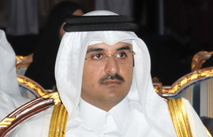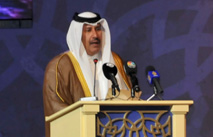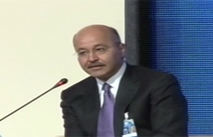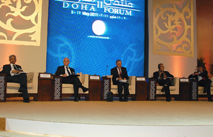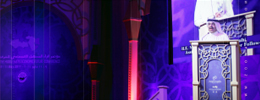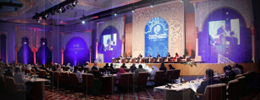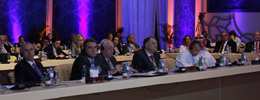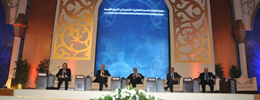

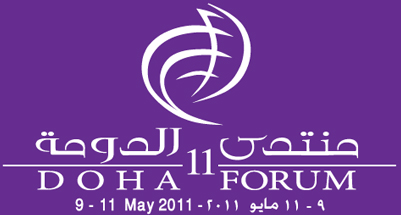
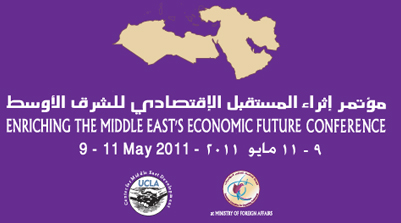
The 11th Doha Forum on Democracy, Development and Free Trade and Enriching the Middle East s Economic Future Conference concluded here on Wednesday afternoon. The events convened at the Doha Sheraton Hotel here on 9-11 May, were attended by more than 600 participants representing 80 world states.
Addressing the closing session, HE Assistant Foreign Minister for Follow up Affairs Mohammed bin Abdullah Al Rumaihi thanked the participants, organizers for deepening this year's forum through valuable discussions and debates aimed at enhancing democracy and economic development in the region.
HE Al Rumaihi reviewed the major themes discussed during sessions and workshops, where a number of experts, academics, researchers and civil society activists took part. Resolving the current issues and challenges the region is facing, requires the implementation of politico-economic reforms as well as the adoption of a "real comprehensive development policy, where economic and political reforms go side by side", he said. The region is in process of democratic reform which should bring about a sort of balance between political and security axes, HE the Assistant Foreign Minister for Follow up Affairs explained.
At the international level, reforms are as well required for international institutions among which the UN Security Council, noting that the State of Qatar is hosting on May workshop on UNCS reform. The participants called upon the region s governments to put into practice a system to combat corruption and bodies in charge of restituting public money and assets.
News
HH the Heir Apparent Opens Doha Forum & Enriching the ME Economic Future Conference
HH the Heir Apparent Sheikh Tamim bin Hamad Al Thani opened Monday morning the Doha Forum on Democracy, Development and Free Trade as well as Enriching the Middle East - Economic Future Conference at the Doha Sheraton Hotel.

HH the Heir Apparent delivered a speech at the opening ceremony in which he underlined that Arab revolutions have shown that young people are not engaged in life consumer stuff as it seems, but they are eager for freedom which would not contradict with the culture and Arab identity and Islamic religion and civilization. HH the Heir Apparent stressed on the fact that the storming events that the Arab region has experienced and is still experiencing have proved that the people that are alive and aware of their existence, become the makers of their own history and future. Our Arab people are the ones that make this new historic era. Justice does not come on the tanks of occupation. Wars led to impose democracy were not helpful, moreover, they were a major repulsive obstacle. People had to overcome them in order to overcome their fears that the substitute to tyranny might be instability under foreign colonialism. HH the Heir Apparent proposed that everybody has to be used to the idea that the Arab world no longer accepts to see his individual dignity trampled by local tyranny, or by a foreign colonialism. He hoped that change will be on the basis of awareness and planning and without major shocks. And whether the change comes through a revolution or gradual reforms, everybody will see that there is an effective player on the scene and it is the Arab public opinion. It will no longer be possible to impose or dictate him. Then it will be clear that the Arab public opinion upholds much more to justice at both, the regional and global levels. HH emphasized that the Palestinian cause is in fact the cause of all Arabs and that this is the attitude and position of people, and this is the position of the Arab opinion. This is not just a slogan raised by some Arab regimes. HH said that he confirmed on many occasions that the failure to achieve justice for the Palestinian people upon which peace in our region should be based, is one the major factors of instability and one of the causes of extremism and violence in the region. HH the Heir Apparent called on the international community to exert more efforts to put stress on Israel and convince it to implement the related resolutions adopted by the international legitimacy. Regional and international security and peace are threatened unless the Palestinian cause would not be solved. HH stressed that the State of Qatar believes in peace, cooperation and dialogue between peoples and states. As a member of the international community, Qatar continues to exert efforts aimed at making this world a more peaceful and secure. Qatar mediated many regional conflicts and launched a number of initiatives to support development and offer human assistance in emergency cases under the auspices of the UN. HH the Heir Apparent thanked the friendly countries, which supported these initiatives, and expressed hope that they would gain support from more countries
The Doha Forum in the past was a place to discuss issues such as development, reform and popular participation, human rights and women''s empowerment and security, peace and stability in our region, HH the Heir Apparent said. However, Doha Forum was not the only place where these issues have been discussed, these issues were addressed by research and studies centers both regional and international that calling for freedom, equality and respect for human rights, HH added. "These values are advocated by all religions and international conventions and in our region some considered rhetorical words," HH said. "When young people discuss these issues, they do that to spend time or to fill the void. Therefore these issues were not taken the need for reforms in line with the requirements of social and economic development seriously". "Because there are no respond to the ambitious of new generations that want to achieve the freedom and dignity, we see today the popular revolts demanding change and reform towards providing the people of citizen rights and justice," HH added.
HE Prime Minister Meets Senior Officials Attending Doha Forum
HE the Prime Minister and Foreign Minister Sheikh Hamad Bin Jassim Bin Jabor Al Thani met separately at the Doha Sheraton Hotel here on Monday with each of Tajikistan Foreign Minister Khamrokhon Zarifi and swedish Foreign Minister Carl Bildt.

Doha Forum to discuss Mideast revolutions
Transformations taking place in the Middle East will come up for an intense debate among analysts and experts from all over the world at the Doha Forum that begins at the Doha Sheraton here today.

A discussion on the changes rocking the Middle East is slated to be held at the very opening session of the key Forum this morning. A new and expanded view about economic development will, though, be at the nucleus of the 11th Doha Forum.
The Forum for the first time features the Middle East's Economic Future Conference, say officials.
The Heir Apparent H H Sheikh Tamim bin Hamad Al Thani will today formally open the three-day forum which will be attended by over 600 delegates comprising government officials, academics, leading figures, and the civil society from more than 80 countries.
"The conference, which is planned to be held annually, will further enrich the Forum, as it projects a different view of development as well as raising people's awareness on the type of vision which allows the region's economy to grow," said the Assistant Foreign Minister for Follow Up Affairs H E Mohammed Abdullah Al Rumaihi, during a press meet yesterday.
Al Rumaihi said this is also the first time that the Doha Forum will hold workshops which focus on economic strategies, the importance of raising awareness on rule of law, media freedom, political and economic reform and peace in the Middle East among others.
"If you talk about reform and advancement, it has to start with human and economic development," said Prof Steven L Spiegel, Director of the UCLA Center for Middle East Development (CMED), University of California – Los Angeles, who have been working with Doha Forum for the last three years.
Prof Spiegel said apart from fundamental development issues, the conference will centre on other avenues of economic development such as sports, art, and franchising.
"People don't normally see sports, art and culture as mechanisms for economic development," he observed, adding in the next years every Qatari will benefit in the coming World Cup 2022.
Another important topic to be discussed in the conference is the huge business of franchising around the world which according to Spiegel is not yet popular in the region.
A separate session on Water Security in the Middle East will be held and a report on water and the importance of water in development will for the first time be unveiled at the forum. In the wake of the recent uprisings in various countries, Al Rumaihi said the Forum will also be discussing new issues on political and social transformations and how to overcome the ongoing crises confronting the region.
Doha Forum: Euro-Arab Dialogue Key to New World Order
Dialogue between Europe and the Arab worlds, approaching democracy as a process and not ideology would catalyze the global quest towards achieving a new world order based on peace,

Prominent speakers urged adopting the fundamentals of democracy and stressed its link to economic and social justice, human rights, education, self-determination, reforms and strategic international co-operation during the opening session titled Insights on the World Political Scene and the Transformations in the Middle East'.
In this address to the conference comprising leaders, policy-makers and experts from over 80 countries, Sweden's Foreign Minister Carl Bildt said, "We need a profound dialogue between Europe and the Arab world."
Besides holding focused discussions "we need to learn from the European experience" in the transformations going on in the region, said Bildt and mentioned the rise of Asia and a "confident Africa" and Mercosur.
Stressing the need for co-operation and a common agenda, Portugal's Foreign Minister Luis Amado said, "The challenge is how we can work together, otherwise we all will fall into an abyss together. How can we stabilize the region if cannot stabilise the relationship between Europe and Arab? That is why the Doha initiative is so important."
Developing a common agenda for the future between the representative bodies is imperative because of the complexities of the pressing issues, he said and warned that "time is running out considering the deep transformation going on in the world".
America's prominent voice in civil rights activism Rev Jesse Jackson said, "Superficial change is not enough, change should be deep down and institutional."
Call for freedom of expression to promote individual ingenuity
Experts on Middle Eastern politics have called for sweeping reforms regarding freedom of expression and education in order to maximise the potential of popular participation in society and individual ingenuity.

His criticisms were not limited to governments, however. Egyptian journalists, said Rumaihi, used to be afraid of criticising their government, but now they are afraid to criticise the revolution. He also warned that religion and religious-based parties will dominate elections as Arab people have "not been able to dismantle fanatical discourse." "If we want to build a new future, first we must build a new past," said al-Rumaihi. "History is overburdened with fanaticism." Khalid Abdulla-Janahi, Group CEO of Dar al-Maal al-Islami, echoed al-Rumaihi's criticism of the repressive nature of many Arab societies, saying that lessons from the past have not been learned and people are still not allowed to ask key questions of the authorities.According to Janahi, Egypt's short-term economic outlook is bleak as its capital reserves will soon be depleted. Decades of high-level corruption have robbed the country and its people of the benefits of economic growth. He is, however, optimistic that investment from and co-operation with the country's Arab neighbours will help Egypt overcome its financial difficulties, and that a merit based economic system will promote entrepreneurship. "Meritocracy," said Janahi, "has to be the way forward. There is no point in education if meritocracy does not exist." Autocratic leadership and corruption have "not allowed people to be entrepreneurs and innovators," said Janahi. Baroness Elizabeth Symons, former British Minister of State for Trade, also said that in her experience in the British government she noted a distinct failure of Arab countries to trade with each other. A number of the panelists remarked that problems shared by one country will eventually be shared by its neighbours, and greater co-operation and stronger ties were necessary for mutual benefit. Eric Raoult, a former French minister, hailed Qatar's aspirations towards "modernity without giving up its identity," making it a "model for the Middle East." Raoult said that "in one generation Qatar has become a beacon," and a "laboratory for globalisation."
11th Doha Forum Discuss the Blue Peace": Rethinking Middle East Water
The 11th Doha Forum on Democracy, Development and Free Trade discussed here on Tuesday a major report on water security, sponsored by Switzerland and Sweden "The Blue Peace": Rethinking Middle East Water".

The participants debated as well the importance of exchanging information between the concerned parties, implementing common projects, to put forward an innovative approach to engage political leaders, the public and media in harnessing and managing collaborative solutions for sustainable regional water management. Participants from Turkey, Lebanon, Iraq and Switzerland focused on a number of regional water agreements such as the bilateral accord signed between Syria, Iraq and Turkey related to waters of the Euphrates and Tigris basins.
Since 1962, Syria, Iraq and Turkey have been meeting on a regular basis to discuss water developments in the Euphrates and Tigris basins. The multipurpose Protocol of 1987 marked the first bilateral agreement between Syria and Turkey. In it, Turkey committed in writing to release a minimum of 500 m3 per second over the Syrian border. Touching on Water in the Israel/Palestine Conflict, which is in hot dispute between the Israelis and the Palestinians in light of the chronic water shortage, participants called upon building initiatives between Israel and the Palestinian National Authority in this concern. On the objectives and strategies presented on "The Blue Peace": Rethinking Middle East Water" report, which was officially launched by Micheline Calmy-Rey, President of Switzerland in Geneva in February 10, it is necessary to define specific objectives so that goals can be set and strategies can be formulated. Speaking to Qatar News Agency (QNA), former Turkish Foreign Minister Yasar Yakis said aims are to establish cooperation between Turkey, Syria, Iraq, Jordan and Israel over the next 20 years.
The detailed 150-page roadmap aimed at achieving ten objectives, which are: the sustenance and replenishment of rivers, saving groundwater aquifers, managing demand and sectoral inefficiency, storage management, optimization and coordination of marginal water, containing environmental degradation, addressing internal and regional disparities and meeting the challenges of climate change and using water as an instrument of peace. On the strategies, the report said a complex approach is required to address these objectives, which include enhancing supply through the establishment of a cooperation council for water resources in the Middle East, integrated water resources managements (IWRM), cooperation in the Euphrates-Tigris Basin, de-centralized water management in the Palestine Authorities, confidence building initiatives between Israel and PA, Red Dead Sea Canal and export of Turkish national rivers to the Jordan valley. Panellists put an accent on the Cooperation Council for Water Resources as instrument to develop a shared and cooperative vision. According to the report, such a council should be constituted by Heads of Governments or their High representatives and supported by institutional machinery to implement political decisions.
It is worth mentioning that Ministers and senior officials from Jordan, Lebanon, and Turkey have received the report and it was presented in London, Stockholm and Brussels. Among detailed sub-sections, the report elucidates ways for Israel and Syria to break years of deadlock over management of Lake Kinnernet (or Tiberias) on the Golan Heights, not with a breakthrough peace deal but an interim accord to manage the resource base as a "Regional Commons ". For his part panelist Mr.Selim Catafago , President of Litani Water Authority in Lebanon said we need to have a comprehensive model that takes in consideration all kind of challenges.
Doha Forum Discusses International stability
The sixth session of the Doha Forum on international stability discussed this afternoon various issues related to the future of peace in the Middle East, security of energy imports and secure supply lines, addressing the situation of the people''s revolution and strategic implications, escalation of Islamophobia and the extreme right in Europe.

The Doha Forum reviews the prospects of EU-analogue in the Arab world
The idea of establishing an analogue of the European Union to solve political, economic and social problems concentrated in the Arab region has become one of the topics of the 11th Doha Forum on Democracy, Development and Free Trade launched on May 9 in the capital of Qatar.

"Ongoing Arab revolutions have proved, that young generation is hardly committed to the ideas of the society of consumers, but strives for a real freedom, which contradicts neither Arab traditions, no Islam," said at the meeting.
According to Prime Minister of Iraqi Kurdistan Barham Salih, there is still a wide gap between the Arab countries, but, at the same time, there share the same culture, religion and common values. "Therefore, it's time to think about absolutely new frameworks of collective cooperation in the region similar to those working in Europe," he added.
However, the idea of establishing the Arab Alliance raises great doubts among the EU representatives. "Europe passed a long and hard way to unity, though European countries had always been closer to each other, than Arab countries in nowadays," Swedish foreign minister Karl Bildt said. "Differences in political institutions and levels of social-economic development of the Arab countries do not allow us discussing this idea and its implementation in the nearest future," he confirmed.
His Portuguese counterpart Louis Amadu sounded more positive, however. "If you do not believe in your neighbors, how we can talk about stability in the region in general," he noted. According to Amadu, Europe should, on the contrary, take part in working out a "general agenda" together with the Arab countries, to help the region in preventing the danger of a new cultural clash.
- Mr Hamrokhon Zarifi
Minister of Foreign Affairs Of the Republic of Tajikistan - Speech by Mr Hamrokhon Zarifi Minister of Foreign Affairs Of the Republic of Tajikistan
- Carl Bildt
Foreign Minister, Sweden - Remarks at opening of Doha Forum 2011 by Carl Bildt

